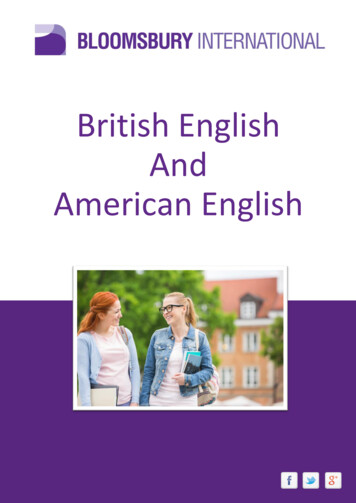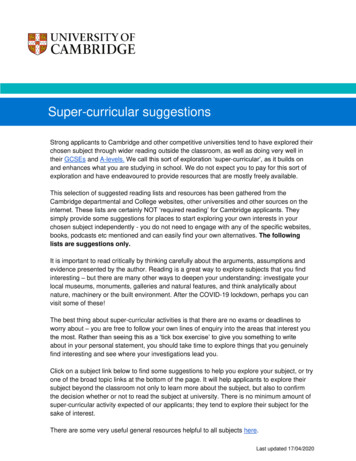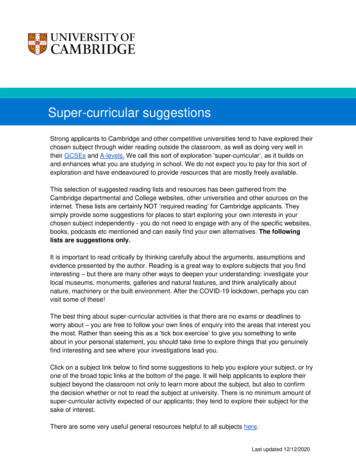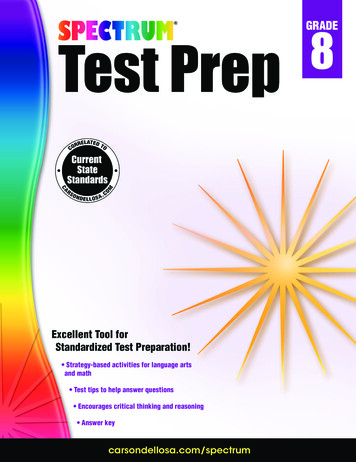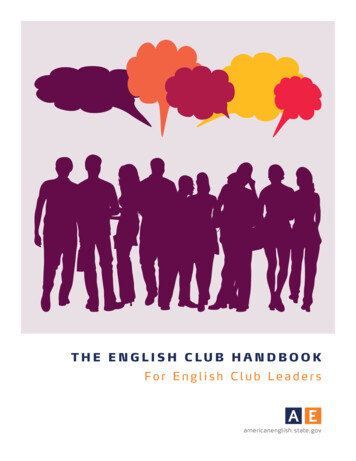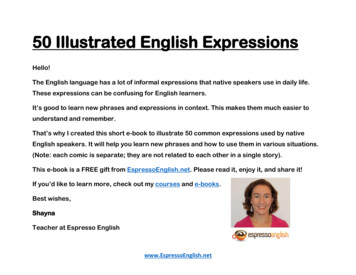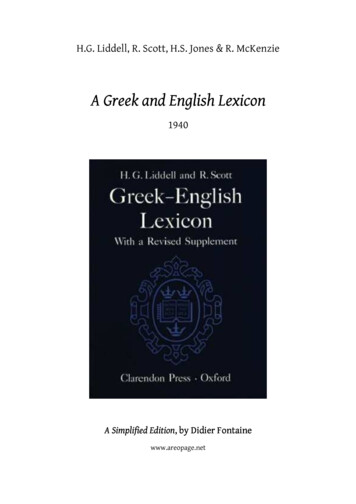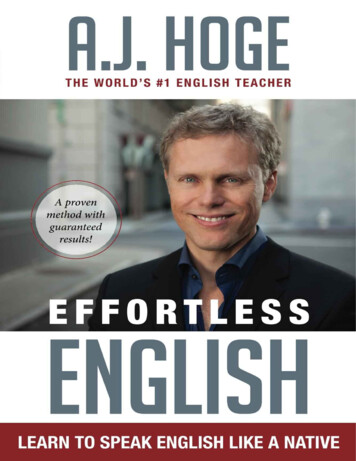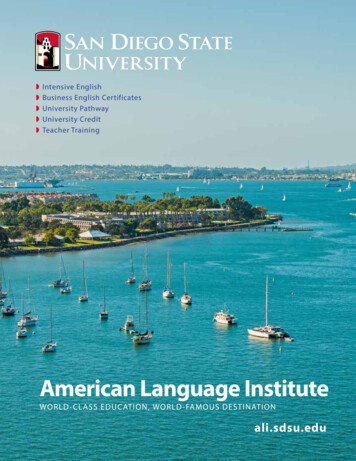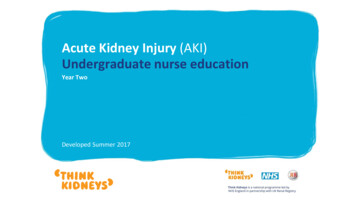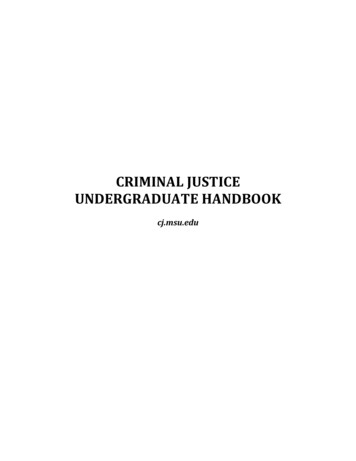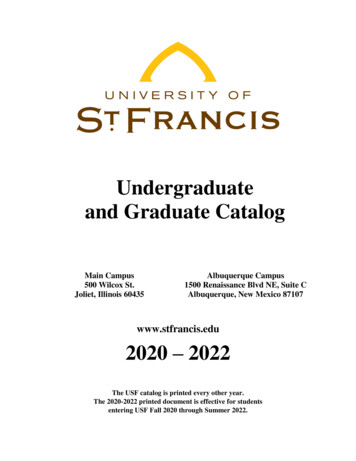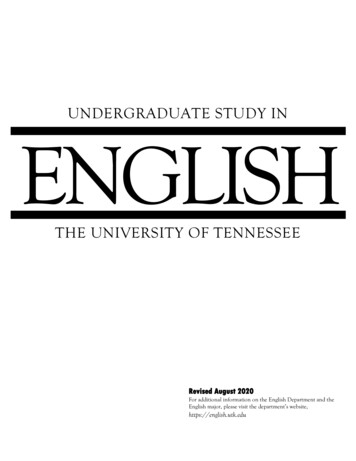
Transcription
UNDERGRADUATE STUDY INENGLISHTHE UNIVERSITY OF TENNESSEERevised August 2020For additional information on the English Department and theEnglish major, please visit the department’s website,https://english.utk.edu
Table of ContentsWhy Major in English? . 1What Does the English Major Involve? . 1After Graduation, What Next?. 1Special Features of the Department . 1A Faculty That Is Distinguished and Diverse . 1Opportunities for Off- Campus Study . 1Scholarships and Prizes . 2Individualized Courses and Programs . 2Internships in Writing. 2English Honors Concentration . 2English Education and Certification for Teaching . 2The Minor in English . 2The Program . 2How Does Advising Work? . 2Declaring English as a Major . 2Selecting A Concentration and Mentoring . 2Prerequisites for the Major . 3Course Prerequisites . 3Major Requirements. 3English Course Offerings . 3Writing . 3Literature . 3Theory and Criticism . 3English Language . 4Folklore . 4Film . 4Independent Study (English 493) . 4Course Descriptions . 4Checklist for English Major Concentrators. 6General Education Courses (WC) . 13General Education Courses (AH) . 14Recommended Courses for Secondary Ed. Careers . 14Index of Course Descriptions . 15 and 16
student develop a mastery of self-expression and argument.Why Major in English? The English Department is one of the strongest and most prestigious departments at the University of Tennessee, with an undergraduate major both engaging and versatile. The departmentseeks to prepare its majors for their professional and civic responsibilities within a rapidly evolving society, a globalized culture, and an increasingly information-based economy. Throughthe study of English, students learnIn addition to the four concentrations, a major may choosean individualized program ( see p. 2).After Graduation, What Next?Because of the rich and extensive training they acquire in critical thinking, advanced reading and analysis, literary and culturalhistory, and oral and written communication, English majors enjoya range of career options upon graduation. Some pursue teachingcareers by applying for admission to the English Education licensureprogram within the College of Education. Some become freelancewriters, working for themselves or in the different fields of journalism.Others enter law school, become professional editors, and publishers,or embark on careers in management, public relations, advertising,sales, administration, library science, or public service. Graduateswith a special interest in academic life pursue graduate study inEnglish or related fields. Finally, students who take advantage of thedepartment’s strong technical communication course offerings pursuecareers in technical writing and editing, Web page design, and otherfields essential to today’s changing economy. For more informationabout careers for English majors, contact the Center for CareerDevelopment, Student Union Level 2 (974-5435; career.utk.edu). to analyze and interpret literary and non-literary texts; to construct effective arguments; to demonstrate effective writing skills; to demonstrate advanced research and information literacyskills.While developing these skills, students are also urged to discover their own critical and artistic voices by gaining proficiencyin organizing complex material, addressing multiple audiences,and understanding the medium of language. Finally, in the spiritof liberal education, the study of English also contributes to satisfying society’s increasing need for a citizenry skilled in criticalthought and communication.English offers a varied and challenging curriculum, introducing students to what is best in the traditional fields of Englishand American literature, rhetoric, and writing (creative andotherwise), while also offering courses in contemporary literature, cultural studies, cinema studies, critical theory, and linguistics. This diversity allows our majors to acquire an unusuallybroad range of knowledge and skills.Special Features of the DepartmentA Faculty That Is Distinguished and DiverseThe English Department has a large faculty, with over 40members of the professorial staff, and it has a distinguishedrecord in both teaching and research. Sharing a commitment toeducation inside and outside the classroom, members of theEnglish Department faculty regularly win college and universitywide teaching awards. Because classes are small, instructors cometo know their students, participate in their growth, and workclosely with their writing.Since the English Department is composed of nationallyrenowned scholars and writers, students are exposed to the latest intellectual, creative, and professional developments in thediscipline’s many fields. In recent years English faculty membershave published important books on medieval liturgical writing,English Renaissance drama, 18th-century women playwrights,Southern literature, postmodern fiction, Native American andIndigenous rhetorics, English as a second language, and literaryaesthetics, to name just a few. The department’s creative writingfaculty is similarly accomplished: our poets and fiction writerspublish in the New Yorker and other prestigious literary journalsand have written a number of highly acclaimed books.What Does the English Major Involve?English majors satisfy three sets of requirements. University requirements and College of Arts and Sciences requirements areexplained in the Undergraduate Catalog; college requirementsare further detailed in the Curriculum Guide and Handbook,which is available from the Arts and Sciences Advising Center.English Department requirements are explained in this booklet.When becoming an English major, all students must first satisfythe prerequisite of the major by taking two 200-level classes of theirchoice. After satisfying the prerequisite, majors—in consultationwith a departmental academic advisor—take 10 courses numbered300 and above, distributed so as to ensure both breadth and depthof study.An English major can choose among four concentrations: The concentration in Creative Writing aims to help thestudent develop his or her artistic voice through the writingof poetry, fiction, and drama. The concentration in Literature involves study andanalysis of novels, poems, plays, and non-fictional prose inEnglish. The concentration in Rhetoric and Writing uses bothwriting workshops and theoretical approaches to help theThe concentration in Technical Communicationprepares the student to write for business, industry, andscience.Opportunities for Off-Campus StudyThe English Department’s varied program of study can be enhanced by off-campus study. In Drama in New York (English492), students spend eight days in December or early Januarystudying drama in performance on the Broadway and Off-Broadway stage. In Drama in Stratford and London (English 491),1
students spend three weeks analyzing both classical and modernplays after seeing performances and hearing lecturers by Britishscholars, actors, and other theater professionals.requirements for admission to the English Education Programare a 2.7 overall GPA and a 3.0 GPA in the major. A recommended course of study for those considering a career in secondary education can be found on page 14. For more information,including how to schedule an interview for admission, studentsshould contact the College of Education’s Office of Advising andStudent Services, 332 Bailey Education Complex, 974-8194.Scholarships and PrizesEach year, the English department recognizes student excellencewith a number of scholarships and prizes. Details and applicationforms can be found on the English Department web page,https://english.utk.edu. Questions may be addressed to theEnglish Undergraduate Office, 974-5401, or to Professor HeatherHirschfeld: hhirschf@utk.edu.The Minor in EnglishAn English minor consists of at least 15 semester hours of English courses at the 300 and 400 levels. An English minor withan emphasis in Technical Communication consists of at least15 semester hours of English courses chosen from the following:(1) at least three courses in technical communication (chosenfrom 360, 460, 462, or 466); (2) one course in rhetoric, writing,or linguistics, or another course in technical communication,chosen from the following list: 355, 357, 360, 371, 372, 455,460, 461, 462, 466, 470, 471, 472, 485, 494, 495, 496; and (3)one other 300- or 400-level English course.Individualized Courses and ProgramsFor students who wish to pursue studies or projects not adequately treated in existing courses, the department offers anopportunity to participate in independent study with a facultymember. In addition to approving such courses of study, thedirector of undergraduate studies is also empowered to approveindividualized concentrations developed by students in consultation with their advisors. These programs should be designed toachieve academically sound objectives that are not addressed bythe course requirements for established concentrations.The ProgramHow Does Advising Work?Internships in WritingThe department has a dedicated professional advisor, Ms. KirstenPitcock. She meets individually with students when they enter theUniversity and she continues to advise them throughout theircareers. She helps students develop their academic plans throughgraduation; explains policies and procedures; provides informationabout degree requirements, academic standards, and milestones;and connects them to campus resources that promote academicsuccess and career exploration.A limited number of part-time positions in writing and editing,both within and outside the university, can be arranged for superior students in upper-division writing courses. Depending onthe type of work or training involved, such positions might leadto publication, academic credit, or financial compensation. Students seeking information on internship opportunities shouldcontact the English Undergraduate Office, 974-5401 or 311McClung Tower.In order to benefit most from the advising session, students arestrongly urged to prepare by reviewing their progress in meetingcollege and major requirements. This is most easily done byreviewing the DARS report. More information on advising isavailable through the English Undergraduate Office, 974-5401.English Honors ConcentrationFor students who qualify, the department offers speciallydesigned courses at all undergraduate levels (see page 16).Freshman and sophomore honors courses are enriched versionsof the regular sections in composition and in American andBritish literature. The junior-senior honors seminar, limited to15 students, is given every fall by a distinguished member of thefaculty in an area of her or his expertise. The senior honorsthesis allows a student in the honors concentration to work onan independent creative or research project under the guidanceof two members of the faculty. The Ann Hight Gore Thesis Prize,a cash award, is given for the best honors thesis at the end ofeach spring semester. Admission to the junior-senior honorsconcentration is by application. To receive “Honors” in Englishon their transcript, a student must have a 3.25 or better overallGPA; a 3.5 or better GPA in English courses; grades of A or B inEnglish (Honors) 398 and 498; and have completed at least 12hours of English honors course work. Students who need moreinformation about the program should contact the EnglishUndergraduate Office, 974-5401 or 311 McClung Tower.As an aid to registration, each semester the department posts onlineand publishes a packet of descriptions of the courses at the 300 and400 levels to be offered the following semester. These descriptionscontain an account of the course readings and requirements. Theyare most easily available on the English Department web page,https://english.utk.edu.Declaring English as a MajorStudents who intend to become English majors can declare usingan online form available on the English Department web page,https://english.utk.edu (go to Current Students Tab,Undergraduate, Declare English).Selecting a Concentration and MentoringStudents select a concentration either when they declare the majoror after they have completed two 200-level courses. Based on theirconcentration, students are assigned a mentor, with whom they candiscuss course selection and research and career plans.English Education and Certification for TeachingStudents are responsible for contacting their mentor to schedule anappointment.Students who plan to be certified to teach English in secondary schools should apply for admission to the English EducationProgram in their junior year. Certification requires a 16-hourminor in education and a fifth-year internship. Current GPA2
Prerequisites for the Major441, 442, 443, 444, 451, 452, 453, 454, 456, 459, 479,480, 481, 482, 483, 486, 490, 491, 492Two-200 level courses are prerequisite for the major.The following sequences are recommended:201-202; 207-208; 221-222; 231-232; 237-238.5.Rhetoric and WritingCourse PrerequisitesEnglish 101 and 102, or the equivalents, are prerequisites of allEnglish courses at the 200, 300, and 400 levels.Certain upper-division courses have additional prerequisites;these are stated in the descriptions of the individual courses inthis booklet.1.English 355 (or 357) and any two of the following courses:455, 470, 494, 495, 4962.One other course in rhetoric and writing. In addition tothe course listed in item one which was not taken, youmay choose from the following list: 360, 363, 364, 365,366, 367, 368, 455, 460, 461, 462, 463, 464, 466, 470,484, 490, 494, 495, 4963.One upper-division English elective.Major RequirementsThe major consists of 30 hours of 300- and 400- level coursework. Courses may NOT count in more than one category.Depending on the course content, Special Topics, MajorAuthors, Junior—Senior Honors Seminar, and any other coursewith variable content may be petitioned to count in a categorywhere it is not listed.All majors are required to complete ten courses of 300-400-levelEnglish of which:One must be pre-1660 literature (301, 321, 401, 402, 403, 404,405, 406, 409, 410);One must be of literature written from 1660-1900 (302, 411,412, 413, 414, 415, 419, 420, 424, 431, 432, 433, 435);One must be post-1900 literature (340, 345, 421, 423, 434, 436,451, 452, 453, 454, 456, 459);One must be in language, theory, folklore, cultural, ethnic,gender, or film studies (301, 302, 303, 306, 321, 331, 332, 333,334, 335, 336, 339, 341, 342, 371, 372, 381, 403, 422, 443, 444,471, 472, 474, 476, 477, 479, 480, 481, 490, 496); andOne must be a capstone course (398 [honors only], 443, 470,482, 483, 485, 486, 489, 498 [honors only].Technical CommunicationEnglish 363 (or 367) and 463; or 364 (or 368) and 4642.Three other writing courses. In addition to those courseslisted in item one which were not taken, you may choosefrom the following list: 355, 357, 360, 363, 364, 365,366, 367, 368, 455, 460, 461, 462, 463, 464, 466, 484,495, 496English 376 (or 377) should be taken at the beginning ofthe major2.One 400-level course in pre-1800 literature: 401, 402, 403,404, 405, 406, 409, 410, 411, 412, 413, 4313.One 400-level course in American literature: 431, 432,433, 434, 435, 436, 441, 442, 443, 4444.One additional 400-level literature course: 401, 402, 403,404, 405, 406, 409, 410, 411, 412, 413, 414, 415, 419,420, 421, 422, 423, 424, 431, 432, 433, 434, 435, 436,English 360 and any two of the following: 460, 461, 462,4662.One other course in rhetoric or writing. In addition to thecourse listed in item one which was not taken, you maychoose from the following list: 355, 357, 363, 364, 365,366, 367, 455, 463, 464, 470, 484, 490, 494, 495, 496One upper-division English elective.English Course OfferingsWritingWriting courses offer students the opportunity to improve theirskills in creative, expository, and technical writing. Studentslearn to express themselves more effectively, and they discoverthe power language has to organize and develop thought. Students practice writing traditional essays, poetry, fiction, andscreenplays, or they write and edit technical reports. Thus student writers gain important cognitive skills while they furthertheir personal, academic, and professional development.Courses in rhetoric allow students to study writing as a medium of communication and to explore the complex relationshipsamong writer, audience, and the wider world they are seeking tounderstand.LiteratureCourses in literature are designed to broaden students’ exposureto literary texts and to deepen their knowledge and appreciation of works of imaginative writing. Students develop skills inreading complex works from a variety of perspectives, and theyenrich their understanding of the relation between literatureand its historical and cultural contexts. By exposing studentsto a range of historical periods, authors, and genres, courses inliterature introduce students to rich fields of canonical and noncanonical texts. These courses also sharpen students’ abilities toanalyze and write about literary works and cultural issues.Literature1.1.3.Creative Writing1.One upper-division English elective.Theory and CriticismBy addressing the question of how literary works are investedwith meaning, the English Department’s courses in theory andcriticism allow students to explore the act of reading from a va-3
Course Descriptionsriety of theoretical positions. These courses introduce studentsto the history of aesthetics and literary theory, as well as to morerecent theoretical schools: psychoanalytic theory, feminism andgender studies, reader response, new historicism, theory andrace, deconstruction, and cultural studies. Students are encouraged to understand their own reading practices and the criticalassumptions that underlie them.English 101 English Composition I (3) Intensive instruction inwriting, focusing on analysis and argument. Strategies for readingcritically, analyzing texts from diverse perspectives, developingsubstantive arguments through systematic revision, addressing specificaudiences, integrating sources, and expressing ideas with clarity andcorrectness. (WC)Grading Restriction: A, B, C, No Credit grading.Comment(s): Students wishing additional help with writing should alsoregister for English 103.English LanguageThe courses in the English language offer students the opportunity to study the structure and function of language as a cognitive and communicative medium while focusing upon thehistory and structure of English as much as possible. The 300level courses serve as general introductions, one from a historical perspective, the other from a contemporary viewpoint. Aftertaking an introductory course, a student may explore the to
https://english.utk.edu . Questions may be addressed to the English Undergraduate Office, 974-5401, or to Professor Heather Hirschfeld: hhirschf@utk.edu. Individualized Courses and Programs . For students who wish to pursue studies or projects not ad-equat
